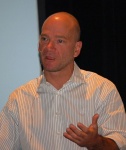Andrew McAfee of
Harvard Business School (click to enlarge) |
I'm listening to Andrew McAfee's keynote at Defrag. He's talking about how social software can be used inside the enterprise. One of the key tasks facing proponents of social software is to articulate the value.
Any worker has relationships of various strengths with co-workers. They might have strong ties to a core group who they work with all the time and weaker ties to others. There are still others who have the potential to provide value through relationship whom the worker doesn't know yet.
The prototypical tool for strongly tied teams is the wiki. He stresses that too many teams are still emailing things around to each other when tools like wikis would be a better way to manage team interaction. Less disruptive and easier to manage. At the strongly tied core, the use of social software leads to artifact creation. That is, what emerges is a document that represents the team's work product.
Organizations spend a lot of time strengthening strong ties--making them even stronger. Nothing wrong with that. But the people to whom you're strongly tied are not likely to be the source o non-redundant information. You usually know what they know.
Andrew believes that sociologist Mark Granovetter's theory of the strength of weak ties provides an important theory for understanding social software and weakly tied teams.
Social networking software, like Facebook provide a way for people to keep up with what weakly tied networks are up to, what they're thinking. What's more, they're starting to have tools for exploiting that weak network. Social networking software brings in non-redundant information and gives you bridges to other groups. Novel information is the emergent artifact for this group.
Potential colleagues have been traditionally brought into contact with each other through what some research calls "brokers." These are the people who know everyone. Andrew sees the blogosphere as the prototypical tool for brining people together inside the organization. If people are doing what Jon Udell calls "narrating your work," then others in the company can discover that activity and form ties.
Andrew says that most managers don't see the value of blogs, thinking of them as marginally time-wasting. Turn it around and think of it as workers broadcasting to others what they're doing. The benefits are innovation, serendipity, and bridging. Teams emerge from this activity.
The final group is those co-workers with whom we have nothing in common and have nothing to say to each other. This group actually has value to each other. Using prediction markets, the knowledge of a large group of people can be used to create answers create collective intelligence. The emergent artifact is "an answer" to a question about something of value to the company.
He mentions the Hollywood Stock Exchange as a remarkably predictive tool for determining the earning potential of a Hollywood movie. Companies don't use prediction markets enough to harness their employees' knowledge to create answers for the company.
Here's a table that summarizes Andrew's talk:
|
Tie Strength |
Potential Benefits |
Technology Example |
What is Emergent? |
|
Strong |
Collaboration, Productivity, Agility |
Wiki |
Document |
|
Weak |
Innovation, Non-redundant information, Network bridging |
Social Networking Software |
Information |
|
Potential |
Efficient search, Tie formation |
Blogosphere |
Team |
|
None |
Collective Intelligence |
Prediction Market |
Answer |
The concept of ties provides a foundation for conceptualizing value and selecting the right technology. The result is not that these technologies will make all ties equal. There will still be strong, weak, potential, and non-existent ties in an organization. These technologies can be differentiators that increase rather than decrease the differences. The tools allow these differences to be exploited and value to be created from them.





